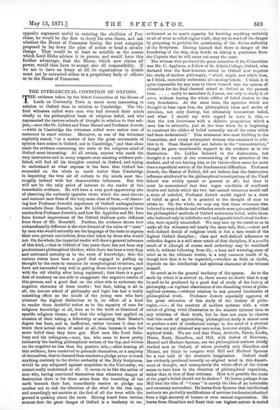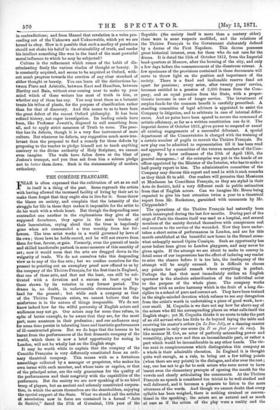THE INTELLECTUAL CONDITION OF OXFORD, T HE evidence taken by the
Select Committee of the House of Lords on University Tests is much more interesting in relation to Oxford than in relation to Cambridge. The Ox- ford witnesses called were men who had devoted their minds chiefly to the philosophical basis of religious belief, and who represented the various schools of thought in relation to that sub- ject,—men like Dr. Liddon and Dean Mansel and Professor Jowett, —while in Cambridge the witnesses called were rather men of eminence in exact science. Moreover, as one of the witnesses explicitly stated, "as a matter of fact the great movements of opinion have arisen in Oxford, not in Cambridge," and that alone made the evidence concerning the state of the religious mind of Oxford more interesting. At all events, anyone who reads the very instructive and in many respects even amusing evidence pub- lished, will find all his thoughts centred in Oxford, and trying to understand at what expense it has been that Oxford has succeeded on the whole so much better than Cambridge in imparting the true air of culture to the minds most tho- roughly imbued with her characteristic influences. But this will not be the only point of interest to the reader of this remarkable evidence. He will have a very good opportunity also of observing the curiously opposite views which the most sincere and eminent men form of the very same class of facts,—of observ- ing bow Professor Jowett's experience of Oxford undergraduates contradicts Dean Memel's, bow Dr. Liddon's experience of them contradicts Professor Jowett's, and how Mr. Appleton and Mr. Ince have formed impressions of the Oxford students quite different from those of Mr. Bounden. Further, the evidence shows how extraordinarily different is the view formed of the value of " tests " by men who would naturally use the language of the tests to express their own private convictions, from that taken by those who would not. On the whole, the impartial reader will drawn general inference of this kind,—that in Oxford of late years there has not been any predominant philosophical thinker, while there has been a very deep and cultivated curiosity as to the roots of knowledge; that the various tutors have been a good deal engaged in pulling up thought by the roots to examine its morphological structure, and have not succeeded very well in getting those roots to grow again with the old vitality after being replanted ; that there is a good deal of tendency on one side to exaggerate the negative results of this process, and a good deal on the other side to underrate the negative character of these results ; but that, taking it all in all, the honour school of philosophy and logic has had a really unsettling effect on the minds of the young men who have attained the highest distinction in it, an effect of a kind to render them doubtful rather as to the capacity of man for religious knowledge at all, than as to the truth or falsehood of specific religious theses ; and that the religious test applied on occasion of their taking a fellowship or assuming their Master's degree has been, and is, ineffectual, rather because it does not touch their actual state of mind at all, than because it asks for more belief than they have got. How men like Lord Salis- bury and his colleagues,—men, too, who seem to know pretty intimately the leading philosophical writers of the day, and writers on the negative no less than the positive side,—after hearing all this evidence, have contrived to persuade themselves, or a majority of themselves, that to demand from teachers a pledge never to teach anything contrary to the divine authority of the Holy Scriptures, would be any safeguard against scepticism in the University, we cannot really understand at all. It seems to us like the action of men who, having convinced themselves that whatever danger of destruction there is for them arises from the trembling of the earth beneath their feet, immediately resolve to pledge one another not to risk the vibration of the wind in the tree tops, and accordingly set sentries at the foot of all the trees while the ground is quaking about the roots. Having heard from various sources that the great danger of Oxford is a tendency to un- settlement as to man's capacity for knowing anything certainly at all of what is called higher truth, they try to ward off the danger by proposing to prohibit the questioning of the divine authority of the Scriptures. Having learned that there is danger of the foundering of the ship, they decide on taking a guarantee from the Captain that he will never cut away the mast.
The witness who produced the great sensation of the Committee was Mr. C. Appleton, a Fellow of St. John's College, Oxford, who declared that the final-honours school in Oxford now requires the study of modern philosophy, "which might, and which does, as I think, materially undermine all existing beliefs. I think it is quite impossible for any man to throw himself into the system of education for the final classical school at Oxford at the present
time really to assimilate it, I mean, not only to study it ab extra, without having the whole edifice of belief shaken to the very foundation. At the same time, the agencies which are brought to bear upon him, the philosophical ideas and modes of criticism, not only destroy, but ultimately reconstruct belief, and what I should say with regard to tests is this, — that the test intervenes with a definite proposition which a man has to subscribe, just at the time when he is beginning to construct the edifice of belief naturally out of the ruins which had been undermined." This statement was most thrilling to the Committee, and every subsequent witness was examined in rela- tion to it. Dean Mausel did not believe in the "reconstruction," though he gave considerable support to the evidence as to the destruction. Dr. Liddon believed in the destruction, but thought it a result of the overcrowding of the attention of the student, and of not leaving him or his tutors elbow-room for more than a superficial survey of the fundamental difficulties. Professor Jewett, the Master of Balliol, did not believe that the destructive influence attributed to the philosophical investigations of the Final School was widely spread or general at all ; but then it must be remembered that that vague condition of confluent doubts and beliefs which the two last-named witnesses would call a state of unbelief, Professor Jowett would regard as a state of belief as good as it is granted to the thought of man to attain to. On the whole, we may say that those witnesses who believed in very definite and orthodox creeds were quite satisfied that the philosophical methods of Oxford undermine belief, while those who believed only in indefinite and undogmatie intellectual tenden- cies, were equally unsatisfied. We may sum up the result so as to make all the witnesses tell nearly the same tale, thus ;—clear and well-defined denial of religious truth is but a rare result of the highest Oxford discipline ; clear and well-defined adherence to orthodox dogma is a still rarer result of that discipline, if a possible result of it (though of course such orthodoxy may be combined with it, without following from it) ; a hazy and wavering state of mind as to the ultimate truths, is a very common result of it, though how that is to be regarded,—whether as faith or doubt,. depends on the intellectual and spiritual character of the witness. himself.
So much as to the general tendency of the system. As to the. mode by which it is arrived at, there seems no doubt that it may be said to be produced by a good deal of study of the history of philosophy,—a vigilant observation of the dissolving views of philo- sophical systems,—without relation to any general landmarks of philosophical truth. Professor Jewett especially approves of the great extension of this study of the history of philo- sophy,—i.e., of the mastery of modern systems with a view rather of giving vivid illustration to the ancient systems than to any criticism of their truth, but he does not seem to observe that this mode of approaching philosophical study is almost sure to produce a sort of intellectual vertigo in the mind of a student who has not yet obtained any sure notes, however simple, of philo- sophical truth. We are told that Plato, Aristotle, Bacon, Locke, Hume, Sant, Hamilton, and Mill, with dashes of Bentham, Mansell and Herbert Spencer, are the philosophical authors chiefly studied now at Oxford, of whom probably only Hamilton and Mansel, are likely to compete with Mill and Herbert Spencer for a real hold of the student's imagination. Oxford itself has evidently produced recently no original mind in this depart- ment of thought, and consequently the whole effort of the tutors seems to have been in the direction of philosophical exposition, rather than in that of final criticism. How is it possible the roots of the pupil's belief should not be shaken ? He learns perhaps from Mill that the idea of " Cause " is merely the idea of an invariable and necessary antecedent. He learns from Spencer that intellectual instincts are probably modifications of nervous tendencies inherited from a high ancestry of human or even animal organization. He learns from Hamilton and Kant that our highest nature is rooted
in contradictions; and from Mansel that revelation is a voice pro- ceeding out of the Unknown and Unknowable, which yet we are bound to obey. How is it possible that such a medley of paradoxes should not shake his belief in the attainability of truth, and render his intellect something like wax in the hand of the most powerful moral influence to which he may be subjected ?
Culture is the refinement which comes of the habit of dis- criminating finely the various shades of thought or beauty. It is constantly acquired, and seems to be acquired at Oxford, with- out much progress towards the erection of any clear standard of either thought or beauty. You can learn all the distinctions be- tween Plato and Aristotle, between Kant and Hamilton, between Hartley and Bain, without ever coming near to make up your mind which of these writers has most of truth in him, or whether any of them has any. You may treat them as a botanist treats his tribes of plants, for the purpose of classification rather than for that of discovery. And this seems to us to have been the great defect of the recent Oxford philosophy. It has been refined history, not eager investigation. Its leading minds have been, like Professor Jowett's, disposed to cull something from all, and to apply strict measures of Truth to none. The prac- tice has its defects, though it is a very fine instrument of mere culture. But whatever its defects, any suggestion much more irre- levant than the proposal to find a remedy for those defects by proposing to the teacher to pledge himself not to teach anything contrary to the divine authority of Holy Scripture, we cannot even imagine. The walls have fallen down at the blast of Joshua's trumpet, and you then ask from him a solemn pledge not to batter them down. Such is the statesmanship of modern orthodoxy.



































 Previous page
Previous page